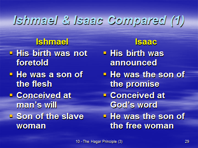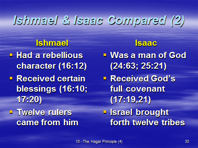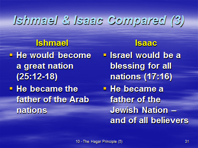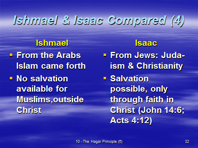Article 2015-07 - The Hagar Principle
Chapter 10: The Hagar Principle
Introduction
Man can think about solutions for his problems, but even the ‘best’ solutions man can think about may not be God’s solutions. We should pray over our decisions, however trivial they may seem. Not even marital agreement guarantees God’s approval, as we see when Abram and Sarai had to make an important decision. In case of marital disagreement God’s answer should be sought, because some decisions have consequences that go beyond our understanding. Yet, even the bad consequences of wrong decisions are not beyond God’s ability to restore. Man’s impossibilities invite God’s miracles.
Scripture reference
… Sarai … said to Abram, ‘The Lord has kept me from having children. Go, sleep with my maidservant; perhaps I can build a family through her.’ Abram agreed to what Sarai said (Gen. 16:1,2)
Trust in the Lord with all your heart and lean not on your own understanding; in all your ways acknowledge him, and he will make your paths straight (Prov. 3:5,6)
The story
Both Abram and Sarai found it hard sometimes to understand what God means. She came with a remarkable proposal, thinking that God might have another solution for giving them a son than in the usual way. In Egypt she had seen Pharaoh’s harem wondered whether Abram might also have another wife, besides herself?
Abram was flabbergasted. His wife suggested this? A slave girl from Egypt? Abram may have wondered what God would think and whether they should not pray about it first. But Sarai seemed to have made up her mind; it was the only solution she could think of.
Abram loved peace and hated arguments with his wife, like most Christians do. Without much thought he decided it wouldn’t harm trying it. That same night the girl, Hagar, was brought to Abram’s tent where they spent the night and a child was begotten that would occupy mankind’s attention to the end of time. And so the Hagar principle was born: impatient man (or woman?) tries to help almighty God to work out His plans, much to that person’s own damage.
Much more was sown that night than a man’s sperm. Seeds had been planted of jealousy between women and sons, of hatred and rivalry between thousands of descendant peoples and even of persecution and murder between world-size religions. Never in the next four thousand years would that conflict end. On the contrary: it would increase continually, to the detriment of countless millions. Fortunately not even that conflict is too immense for God to solve. For now however, we concentrate on how peace departed from Abram’s tents and why God eventually had to separate the warring factions in his household.
Even before Ishmael was born, conflicts surfaced. Hagar became proud, Sarai felt humiliated, Abram was blamed, Sarai took revenge and Hagar fled. The Angel of the Lord sent her back from the desert with clear instructions to submit, but also with beautiful promises that comforted Hagar greatly. Even the boy’s name came from Him and was a promise in itself: God hears. The beginning of the conflict also saw the beginning of God’s solution.
Years of silence followed after the boy was born, and relative peace reigned in Abram’s camp. Sometimes the old people wondered whether Ishmael was not God’s last answer. After all, who was there to compete with the boy, who was already thirteen years old? They had already reached the ages of 89 and 99, far beyond the age of child-bearing.
Then, one day quite unexpectedly, their world was turned upside down when God appeared to Abram with clear promises and instructions. Abram and Sarai even received a new name as sign that their old life and its identity had passed. A new time was about to come. They were now called Abraham and Sarah, both names confirming the promises they had received from God earlier. Abraham would be the father of a multitude and Sarah would be a princess: her shame and the humiliation of barrenness would be taken away. Abraham, until now, had become a father, but Sarah had never yet become mother. Well, that was about to change now!
Scripture reference
Then the Lord said, ‘I will surely return to you about this time next year, and Sarah your wife will have a son’ (Gen. 18:10)
God said to him, ‘Do not be so distressed about the boy and your maidservant. Listen to whatever Sarah tells you, because it is through Isaac that your offspring will be reckoned’ (Gen. 21:12)
The story, continued
A year later Isaac was born from Abraham and Sarah. This was truly God’s doing: man’s impossibility turned into God’s miracle. Both boys grew up and the inevitable happened: quarrels all the time, first between them, then between the mothers and when Sarah wanted to send Hagar and Ishmael away, Abraham objected. She had left before and was sent back by divine intervention and he did not want that to happen again. Besides, he remembered very well what had happened when first he listened to his wife to sleep with Hagar. He wasn’t going to listen to her again! No, here he would decide himself. Until God interfered and told him to listen to his wife this time.
And so Hagar and Ishmael were sent away, this time for good. Peace was restored for as long as the half-brothers stayed apart. It would be a long time before God would come up with lasting solutions for this conflict, that has never stopped smoldering.
Comment
Rational, reasonable and agreed-upon decisions may still not be God’s plan and therefore we should not fail to pray over them before we act. This is especially true with regard to where, how and for what time period we should serve in missions. It is God’s plan we join, and He should decide. There is no problem we might encounter, whether through our fault or that of others, which God cannot use and restore in His bigger plan. We should not try to ‘help’ God work out His plans in our lives. He’s almighty, we’re not.
There is importance in Sarah’s barrenness. It was not just unfortunate coincidence. God had planned it that way, although our dear old couple did not understand the far-reaching consequences of their suffering. When their son Isaac was born, God made it clear that He would bless this ‘son of promise’. When we see later how Isaac became a picture of the Jesus in His willingness to be sacrificed, we understand the missional value of Isaac.
Later we see the same in Rebecca, Isaac’s wife. She was also barren and Isaac, after twenty years of marriage without children, had to pray before she could conceive.
The ‘missionary line’ by means of the ‘son of promise’ then continues via Jacob. History repeats itself when Jacob’s wife Rachel also turns out to be barren. She also conceived on God’s sovereignly appointed time, after which Joseph was born.
Jacob, in sending Joseph to look for his brothers, sends another missionary. God draws our attention to something special when he blesses a woman with barrenness, and then gives her a boy who becomes a missionary. We see that Genesis, but also later.
Two important judges, Samson and Samuel, were also born from barren women and although Mary, Jesus’ mother, was not barren, Jesus was not born in the usual way either.
In a spiritual sense, we learn that true missionaries are not born from human initiative, but begotten through prayer, in God’s time and by His doing only. He saves and sends and makes man participant in His mission. We learn more about this in other Genesis paragraphs, when we consider why the older brother had to serve the younger – which, more often than not, they refused.
In our present story it is clear that Ishmael, son of the flesh and born from the slave woman, refused to submit to and serve Isaac, son of the promise and born from the free woman. In the following generations we see that refusal come back all the time. Esau refused to serve Jacob and Joseph’s brothers refused to serve Joseph. Needless to speak about the great Son of Promise, Jesus Christ, Whom most people on earth refuse to serve.
Deeper background
The theme of the son (Son) is central in the Scriptures and finds its first complete representation of Christ in Isaac. God gave Abraham this promise: ‘…a son coming from your own body will be your heir’. God gives a promise and man seeks a way to help God fulfill it. It is expressed in that little word ‘perhaps’. The lesson is clear: God needs no help to fulfill His promises. On the contrary, human ‘help’ often jeopardizes God’s plans and purposes. Later, history repeated itself when Jacob cunningly obtained the rights of the firstborn and the blessing that came with it.
Finally the promise and its recipients (Abraham and Sarah) are mentioned specifically: the covenant line would run via Isaac, not via Ishmael. We see many differences between both sons.
These 4 slides that show the differences:
 |
 |
 |
 |
Abraham and Isaac are representations of God the Father and of His Son Jesus Christ respectively. Later the line of the promise continues with the younger son, Jacob. It is remarkable that Isaac, himself the younger son of the promise, completely ignored this principle when it came to blessing his own descendants. This in spite of the fact that God had spoken clearly, even before the boys were born. Why he ignored God’s word we don’t know, but he may have interpreted it differently since both sons were born of the same wife and culturally it was very uncommon to favor the younger above the older. Maybe he thought he had misunderstood God, but instead of asking for clearer guidance, he too acted on his own initiative. The consequence was that his household split up, never to be re-united completely. It looks like Isaac’s plan was a deliberate act of disobedience motivated by temporal and carnal appetites. Of course, the way in which Rebecca and Jacob dealt with the problem was equally wrong and delivered the result that they probably never saw each other again after Jacob fled to Paddan Aram. After this chapter Rebecca’s name is not mentioned again, so we may assume that she died before Jacob returned twenty years later. This brings us to the tenth and last theme:
Theme 10: GOD’S COVENANT IS WITH THE SON OF PROMISE |
Preview of the new birth
But there is more to the story. A remarkable characteristic of these sons of the promise (Isaac, Jacob and Joseph) is that they were all born from barren women (Sarah, Rebecca and Rachel respectively). They all had to be prayed for in order to conceive, and none of their sons of promise were the oldest. There is a significant spiritual explanation for this principle. The oldest son is typical for the old life of the New Testament saints, namely that which came forth from the first, the natural birth. The behavior of Ishmael and Esau for instance, is like what Paul would later describe as works of the flesh. The youngest son is typical of the new life of the saints, which comes forth from being born again. This new life is literally their younger life – it starts later than the old life – and begins at their spiritual birth. None of the boys Isaac, Jacob or Joseph was born by the power of man but exclusively by God’s promise.
Every saint carries these two natures inside and is responsible to make the older serve the younger, in other words: to submit the cravings of the old carnal nature to the demands of the new spiritual life in Christ.
Discussion & dialogue
- Find two reasons why missionaries always have to be ‘sons of promise’ themselves (answer is in the Teacher’s Guide)
- Discuss from the examples in Genesis how a son of promise can only come forth from previous barrenness (answer is in the Teacher’s Guide)
- Which other seven themes of the ten reoccur in this chapter? (Answer is in the Teacher’s Guide). Describe how they feature.



























